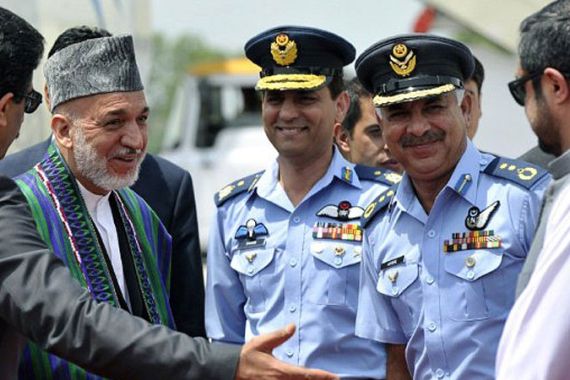Karzai seeks Pakistani help to fight Taliban
Afghan president says Islamabad’s help in combating “extremism and terrorism” can restore stability in region.

 |
| Karzai is on a two-day visit to discuss Pakistan’s role in bringing about reconciliation in Afghanistan [EPA] |
Hamid Karzai, the Afghan president, has called on Pakistan to fight the challenges posed by Taliban and other armed groups to ensure peace and stability in the region.
On a two-day visit to Pakistan, Karzai met the Pakistani Prime Minister Yousuf Raza Gilani on Saturday and discussed a range of issues including the fight against the Taliban.
He earlier met his Pakistani counterpart, Asif Ali Zardari, in Islamabad.
“The brotherly role of Pakistan … together with us in defeating extremism and terrorism and working with us to bring stability in both countries would go a long way,” Karzai told reporters after meeting Zardari.
“As far as Pakistan is concerned, we categorically said that Pakistan wants a peaceful, stable Afghanistan and we are ready to facilitate any Afghan-led, Afghan-owned process of reconciliation and peace,” Tehmina Janjua, a Pakistani foreign ministry spokeswoman, said.
During Karzai’s meeting with Gilani, both leaders emphasised on the need to improve partnerships between the two neighbours.
The Pakistani prime minister talked of special economic and industrial zones in the troubled region between the two countries.
“We call upon investors and friendly countries to come forward and invest in these and similar other projects. These will be an investment in peace,” Gilani said.
‘Mutual distrust’
Al Jazeera’s Kamal Hyder, reporting from Islamabad, said the two countries would have to overcome mutual distrust for improving ties.
“There is a lot to talk about, on the surface it’s pleasantry but behind the scene, there is a lot of hard talking.”
“Recently Pakistani security services blamed the Afghan side for letting the Pakistani Taliban regroup, who have been blamed for conducting attacks inside Pakistan from Afghan territory,” he said.
Both Afghanistan and the United States also accuse Pakistan of not doing enough to prevent gunmen from crossing the border to attack American-led NATO troops and Afghan security forces.
Pakistan says it is already stretched fighting its own home-grown Taliban fighters.
Analysts say it is reluctant because it sees some pro-Taliban groups like the Haqqani network as a counterweight to growing Indian influence in Afghanistan.
Pakistan’s ‘double game’
Islamabad, which denies providing behind-the-scene support to the armed groups, had to face embarrassment after the US special forces killed al-Qaeda leader Osama bin Laden just about 60km from the country’s capital on May 2.
Pakistan, which backed the Taliban government that ruled Afghanistan during the late 1990s, is seen as a crucial player in any attempts to stabilise its western neighbour.
Its intelligence services, particularly the Inter-Services Intelligence [ISI], is still believed to have close links with many of the fighter groups they funded and supported during the war against the Soviet Union.
The South Asian country has often been accused of playing a “double game” but it is seen as an important ally to the US and other NATO members as they seek to bring the Taliban to the negotiating table.
Recent months have seen a spike in violence since Taliban announced its ‘spring offensive’ against the international forces as well as Afghan government officials and installations.
The United Nations Assistance Mission in Afghanistan said on Saturday that 368 civilians had been killed in May, making it the deadliest month for Afghan civilians since at least 2007.
“More civilians were killed in May than in any other month since 2007 when UNAMA began documenting civilian casualties,” Georgette Gagnon, director of human rights for UNAMA, said.